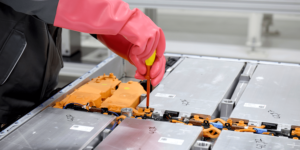PowerCo secures land for Volkswagen’s next battery factory
페이지 정보

조회 162회 작성일 23-04-11 10:01
본문
PowerCo secures land for Volkswagen’s next battery factory

Volkswagen’s plans for a battery cell factory in Spain have entered the next phase by purchasing a plot of land. PowerCo, the Group’s battery division, has signed the papers and was ready to invest €63 mn to buy 130 hectares in Sagunt, near Valencia.
PowerCo CEO Frank Blome announced the deal first on LinkedIn. The Spanish newspaper El Pais later found out how much the Volkswagen Group subsidiary had paid for the areal in Parc Sagunt II. Still, the €63 million spent on the land are just a tiny part of no less than ten billion euros Volkswagen has budgeted to invest along the entire e-mobility value chain in Spain.
Plans for the battery cell factory in Sagunt were confirmed in March 2022. PowerCo aims for 40 GWh capacity per year and plans to employ more than 3,000 people.
The PowerCo gigafactory, therefore, has been declared part of a Strategic Territorial Project (PTE) by the council of the Generalitat Valenciana. The Valencian President, Ximo Puig, pointed out that signing the agreement was an “essential step in the process initiated by the Volkswagen Group for its industrial plan and a milestone for the future of the economy of the Valencian Community”. The industrial estate Sagunt II is well connected to motorways, a port and a railway line.
As reported, PowerCo will begin construction this quarter, with production to kick off in 2026.
Sagunt will thus become the second “gigafactory” in the Volkswagen Group network, next to the identical battery plant in Salzgitter, Germany. The plant in Skellefteå will be overseen by Northvolt in Sweden. PowerCo has already mentioned focusing on Eastern Europe to install another factory but has yet to release information on the PowerCo battery factories five and six.
PowerCo and its latest partner Umicore reportedly aim to supply production materials for 160 gigawatt-hours of cell capacity per year starting in 2015. As Volkswagen calculates, this corresponds to an annual production capacity sufficient for around 2.2 million fully electric vehicles.
As for Spain, Volkswagen Group, primarily through its Spanish brand Seat, aims to make the country a major European production centre for electric vehicles and batteries. The battery plant in Sagunt will be flanked by vehicle plants in Martorell (near Barcelona) and Pamplona.
Martorell may make the small electric car Cupra Raval and another small VW electric car called ID.2 once confirmed. The two models shall replace the current Seat Ibiza and the VW Polo.
The Pamplona plant will build the VW ID.2 X crossover variant and the offshoot for Skoda, called Elroq. These new models correspond to the current VW T-Cross and Skoda Kamiq. The Group targets entry prices of all these small electric cars between 20,000 to 25,000 euros.
Around 60 companies associated with Volkswagen are participating in the Spanish projects. Volkswagen Group had also secured a considerable share of funding through the PERTE electric vehicle programme and received nearly 400 million euros in public aid.
In Sagunt, PowerCo will next open an office and has appointed Thomas Dahlem and Javier Rivera Jornet as members of the board of directors of Power HoldCo Spain, according to CEO Frank Blome. The new staff “will lead the Valencia gigafactory as a central project for transforming the Spanish automotive industry”.
Volkswagen established PowerCo to consolidate activities along the value chain for batteries, including processing raw materials, developing the unified Volkswagen battery, and managing the European gigafactories.
elpais.com (in Spanish), linkedin.com (Frank Blome)